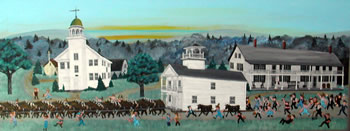
Noyes Academy, a short-lived experiment in inter-racial coeducation, operated for several months in 1835 in Canaan NH until it was forced to close by local racists.
The founders included Canaan residents, other New Hampshire abolitionists, and abolitionists from Boston, Portland, and New York. George Kimball, a Canaan attorney who was among the founders and housed students in his home, wrote, “It is unhappily true, that the colored portion of our fellow citizens, even in the free States, while their toil and blood have contributed to establish, and their taxes equally with those of whites to maintain our free system of Education, have practically been excluded from the benefits of it. This institution proposes to restore, so far as it can, to this neglected and injured class, the privileges of literary, moral and religious instruction.”
“We regard with approbation the plan of establishing schools that will not, either by form of law or of prejudice oftentimes stronger than law, exclude colored youth from a participation in their benefits; and the proposed Academy in Canaan in this state, with reference to the principle, meets our views, and is recommended to the countenance and support of the friends of the people of color,” offered the just-formed NH Anti-Slavery Society. The school was promoted in William Lloyd Garrison’s newspaper, The Liberator.
When Noyes Academy opened in March 1835, it enrolled 28 white and 17 Black students, both boys and girls, including several who had attended the African Free School in New York. Students lived in the homes of teachers. Their courses of study were to focus either on English or Classics. The white students were mostly local, while Black students came from as far away as Philadelphia and had to endure degrading segregated travel to reach Canaan.
When the NH Anti-Slavery Society held its first annual meeting in Concord that June, Thomas Paul, Jr., a Noyes Academy student from Boston with New Hampshire family ties, was an official member of the Canaan delegation. Alexander Crummell, Henry Highland Garnet, and Thomas Sidney, all graduates of the African Free School who attended Noyes, also gave impressive speeches to the NH Anti-Slavery Society at an 1835 meeting in Plymouth.
The school sparked resistance right away, including unfavorable coverage in The Concord Patriot, which took offense at white workers serving a racially mixed group of students at Kimball’s home. “Since the establishment of the school, it has been no uncommon spectacle to witness colored gentlemen walking arm in arm with what ought to be respectable white females. And that respectable people opposed to the school, as well as others, have been invited to parties where the colored portion of the school were also invited guests,” complained the Patriot. By the end of July, the Town had voted for the school to be closed.
The experiment came to a violent end on August 10, when a mob of hundreds approached the school. Garnet picked up a rifle and fired shots at rioters who approached the Kimball home, where he was living. But enraged men from the surrounding area had brought 90 or more teams of oxen, which they hitched to the school building and dragged it off its foundation. An article from the Concord Patriot, reprinted by Garrison in The Liberator, notes that the lawless mob included “many of the most wealthy and respected farmers of this and the adjacent towns.” A month later they moved it again. Later it was torched.
As for the students, the Black students were quietly evacuated from Canaan the night of the attack. But it is important to note that Crummell, Garnet, Sidney, and Paul all went on to prominent roles in the abolition movement, as did Julia Williams, one of the two Black female students. Garnet and Williams later married.
The story of Noyes Academy reminds us of the profound beliefs held by the radical abolitionists, who believed in equality and access to education across lines of both race and gender. It also stands as a disturbing reminder that New Hampshire’s history includes vicious racists as well as revolutionary democrats.
A roadside plaque now marks the site where Noyes Academy once stood.
The Canaan Historical Society has a Noyes Academy Study Group, which has published its findings online.
The story of Noyes Academy is featured in the film, “Shadows Fall North.”

